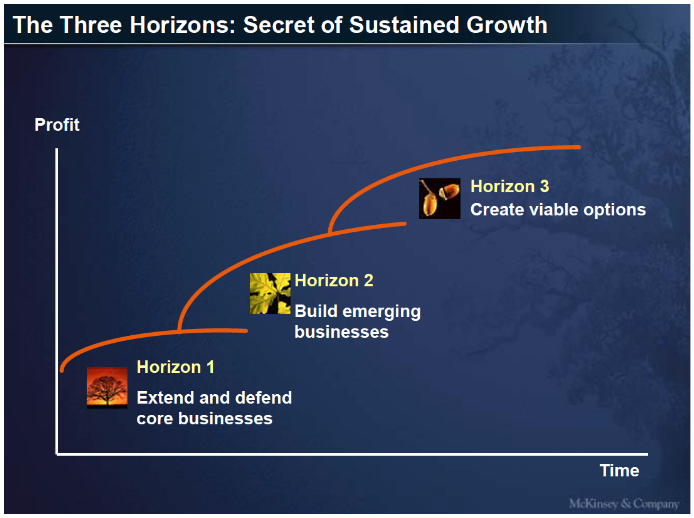Riding the Lean Startup to Sustained Growth
Thanks to Lean Startup Co. training faculty member, Hugh Molotsi, for contributing this piece.
To thrive, a company needs to invest in new growth initiatives and also deliver results through its core businesses. Balancing short- and long-term objectives can seem like an impossible juggling act. Thankfully, there is help on how to do this. McKinsey’s Mehrdad Baghai, Steve Coley, and David White in The Alchemy of Growth describe the Horizon framework of portfolio management as the secret to sustaining profitable growth.

The framework consists of three horizons:
- Horizon 1 (H1) – Established core businesses that deliver most of the company’s revenue and profits
- Horizon 2 (H2) – Fast growing emerging businesses
- Horizon 3 (H3) – Initiatives from which the company will harvest viable options for future businesses
One of the biggest challenges in implementing the Horizon framework is sustaining adequate support for H3 initiatives. Here are a few reasons why H3 activities are often imperiled:
- H1 and H2 initiatives often raid H3 initiatives for resources.
- When quarterly results are at risk, shutting down H3 initiatives can be perceived as the least painful way to cut costs because those reductions don’t put short term revenue at risk.
- H3 initiatives are often evaluated with the same lens as H1 or H2 businesses (revenue or customer acquisition) causing them to be prematurely judged as unsuccessful.
Furthermore, maintaining a balanced portfolio may seem like a luxury that companies under stress feel they can’t afford. Well, there’s good news: Eric Ries’ The Lean Startup provides a methodology for companies to invest in numerous H3 initiatives with minimal resources.
To review, here is how Eric defines a startup:
A startup is a human institution designed to create a new product or service under conditions of extreme uncertainty
By this definition, every H3 initiative is a startup within the enterprise.
Taking this further, here is how Eric defines the Lean Startup:
The Lean Startup is a methodology to systematically address uncertainty through rapid iteration and market learning.
Through the Lean Startup, we try to answer two critical questions:
-
Should we build this new product or service?
-
How can we increase our odds of success?
By having each H3 initiative employ the Lean Startup methodology, each team can employ techniques that efficiently and systematically remove uncertainty. To remove uncertainty, H3 teams must run experiments. The vehicle for running these experiments is the Minimum Viable Product (MVP) which helps teams validate (or invalidate) hypotheses about the value or growth potential of a product. By definition, the MVP is inherently lean, containing only the features needed to run the experiment.
Because each H3 team can be staffed to be a two-pizza team (or smaller), the total company investment in H3’s can be relatively small (less than 10% of product development expenditure). Each H3 team will be measured on how quickly they learn and be encouraged to pivot to new ideas. The mantra is “there is no failure, only learning” and that learning helps uncover more options to explore for future businesses. Only those H3 initiatives that have validated their key value and growth hypotheses will graduate to H2 and additional funding.
Because employing the Lean Startup methodology for H3s helps those initiatives run fast and inexpensively, companies can affordably sustain the investments required to create viable options for the future.
Jeff Zias and I are writing the book Grassroots Innovation in the Enterprise to be published this fall. Are you using the Lean Startup methodology or the Horizon framework in your company? What has worked for you and where have you struggled? We’d love to hear your stories.
Lean Startup Co. offers live and virtual training and consulting to help large complex organizations in all sectors learn to build products and services using the startup mindset. Learn more here or email [email protected]
